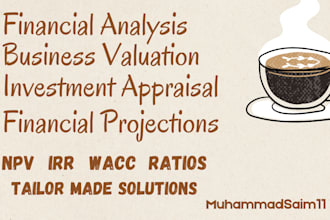What are valuation services?
Valuation is the process of determining the economic value of a business or company unit to assess its fair value for a variety of reasons, including sale value, partner ownership, taxation, and even divorce proceedings.What does a typical valuation process involve?
The typical valuation process involves several key steps:
Data Collection: Gathering all relevant information about the business or asset, including financial records, market data, and operational details.
Financial Analysis: Review the financials to understand the past and current performance and project future cash flows.
Market Analysis: Analyzing industry trends, economic conditions, and comparable market values to position the asset within its market.
Valuation Modeling: Utilizing appropriate valuation methods and models, such as the Discounted Cash Flow (DCF) analysis or comparable company analysis, to derive a value.
Reporting: Compiling the findings into a detailed valuation report that outlines the methodology used, the analysis performed, and the valuation conclusion.
What are the main methods used in valuation services?
The main methods used in valuation services include:
Market Approach: Comparing the subject company to similar companies in the industry whose value is known.
Income Approach: Calculating the present value of expected future earnings or cash flows.
Asset-Based Approach: Summing the values of all of the company’s assets, subtracting liabilities, to find the net asset value.
These methods can be used separately or together, depending on the context and availability of data.
Who typically requires valuation services?
Valuation services are required by a wide range of clients including business owners, potential investors, financial institutions, and legal advisors. They are essential for strategic decision-making, litigation support, tax planning, and compliance purposes.What factors can affect the outcome of a valuation?
Several factors can impact the valuation outcome, including economic conditions, industry trends, the specific financial health and growth prospects of the business, and regulatory environments. Changes in any of these factors can lead to significant variations in the valuation of a business or asset.Is a valuation necessary for small businesses?
Yes, even small businesses can benefit from valuation, particularly when considering selling, seeking investment, or strategic planning. It provides a clear picture of the business’s worth and aids in decision-making.














